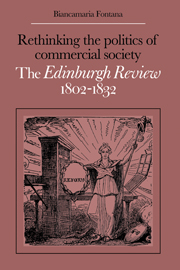Book contents
- Frontmatter
- Contents
- Preface
- Introduction
- 1 Scottish theories of commercial society and the French revolution
- 2 Adam Smith's heritage: the Edinburgh reviewers and the Wealth of Nations
- 3 The definition of political economy: political economy as a social science
- 4 The Edinburgh reviewers and the Whig party
- 5 Commercial society and its enemies: the debate on the First Reform Bill
- Conclusion
- Notes
- Bibliography
- Index
- Frontmatter
- Contents
- Preface
- Introduction
- 1 Scottish theories of commercial society and the French revolution
- 2 Adam Smith's heritage: the Edinburgh reviewers and the Wealth of Nations
- 3 The definition of political economy: political economy as a social science
- 4 The Edinburgh reviewers and the Whig party
- 5 Commercial society and its enemies: the debate on the First Reform Bill
- Conclusion
- Notes
- Bibliography
- Index
Summary
Morals and metaphysics, politics and political economy, the way to make the most of all the modifications of smoke; steam, gas and paper currency; you have all these to learn from us; in short, all the arts and sciences. We are the modern Athenians.
(T.L. Peacock, Crotchet Castle)Amongst the eccentric guests who haunted Mr Crotchet's country residence in Thomas Love Peacock's famous satyrical novel, a leading role was reserved for the Scottish Mr McQuedy, indefatigable authority on all branches of metaphysics and the social sciences, eager to entertain the company with improvised digests of conjectural history and instant lectures on the exchange value of salmon, well at ease in expressing damning judgments on any respectable literary product of the time. With this caricature of the Scottish intelligentsia, uncharitably represented in their role as encyclopedic public mentors, ‘sugar-plum manufacturers to the Whig aristocracy’, Peacock paid his somewhat grudging homage to the established reputation of the Edinburgh Review as the leading literary phenomenon of its time, one which, for better or worse, had brought about a revolution in British journalism and promoted an entirely new style of critical writing. He also offered a representative, if unsympathetic, portrait of one of the main components of early-19th-century British culture, the tradition broadly inspired by the ideas of the Scottish Enlightenment, which was revived at the turn of the century by the emigration of a whole generation of Scottish intellectuals to England.
- Type
- Chapter
- Information
- Rethinking the Politics of Commercial SocietyThe Edinburgh Review 1802–1832, pp. 1 - 10Publisher: Cambridge University PressPrint publication year: 1985
- 1
- Cited by

